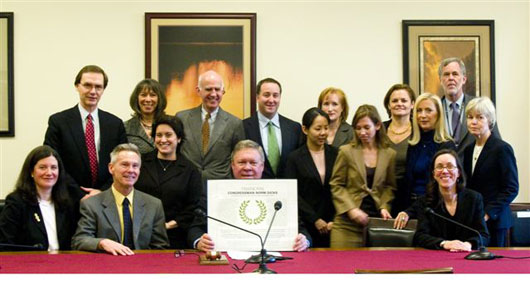April 8, 2008
Legislative Update
House and Senate Add Discretionary Spending in FY09 Budget Resolution
On March 14, before leaving for two weeks of spring recess, the House and Senate each adopted versions of a $3 trillion congressional budget resolution for Fiscal Year 2009. While the resolutions are similar in terms of their spending priorities, they differ on a few major points, including the total amount of discretionary spending for all functions covered by the bill. The House resolution adds $21.8 billion in discretionary funding above the total proposed in the President’s budget, while the Senate resolution adds $18 billion. The congressional budget resolution provides a non-binding blueprint for budget policy and sets the overall amount of money the twelve appropriations subcommittees in each chamber will have to allocate to individual programs under their jurisdiction.

NASAA’s legislative counsel, Tom Birch, and other arts advocates gather to honor Rep. Norm Dicks (D-WA) for his leadership in enacting legislation to increase the funds in 2008 for the National Endowment for the Arts.
NASAA was joined by other arts advocacy organizations in sending a letter to the leadership of the House and Senate Budget Committees leading up to the drafting of their budget resolutions, urging increased funds to be allocated to that section of the budget bill – “Function 500” – which includes spending for the National Endowment for the Arts and the National Endowment for the Humanities, as well as the Department of Education, the Department of Labor, social services in the Department of Health and Human Services, the Smithsonian Institution and the Corporation for Public Broadcasting.
Our letter makes the point that the President’s FY09 budget would cut NEA funds from $144 million to $128 million, “shortchanging the ability of the NEA to connect millions of Americans with the best of the nation’s creative spirit.” Both versions of the budget resolution passed by the House and Senate would add almost $2 billion to Function 500 in discretionary spending above the 2008 level, providing for funds to support increased spending on programs and agencies covered by that section of the budget measure.
Differences between the two measures will need to be worked out by a conference committee as Congress moves into the drafting of its appropriations bills. The biggest sticking point in the negotiations will be whether or not to offset the revenue loss from a one-year fix, estimated at $70 billion, on the Alternative Minimum Tax (AMT), which has reached beyond the very rich for whom it was intended to apply to many middle income tax payers. The House bill would pay for the revenue lost in “fixing” the AMT; the Senate’s would not.
Given the political differences between Republicans and Democrats over how to pay for the tax fix, there is little reason to expect a final agreement on a budget resolution for FY 2009. On the serious the chance that Congress will hold off enacting any appropriations bills this year and pass a continuing resolution until a new administration is in place in the White House in 2009, House leaders may decide that hanging onto their fiscally responsible position on taxation issues may be more important than coming to agreement with the Senate on a budget resolution.
House Support for NEA and Arts Education Appropriations
In an expression of support and advocacy for the National Endowment for the Arts (NEA) and for the Arts in Education program at the U.S. Department of Education, Members of the House have signed two separate letters addressed to the Appropriations Committee leadership regarding the importance of increased funds for the NEA and arts education.
Eighty-two Representatives signed the letter addressing NEA funding, which states: “We are requesting $176 million to support the NEA’s core mission and expand popular initiatives like the Challenge America program. The NEA was last funded at this amount in 1992, and has never recovered from a 40 percent budget cut in FY1996.” The letter circulated by the co-chairs of the Congressional Arts Caucus, Reps. Louise Slaughter (D-NY) and Christopher Shays (R-CT), called on their fellow legislatures to sign the letter to “support arts funding, increase economic development and strengthen our children’s education.”
NASAA and our colleague arts advocacy organizations are urging Congress this year to build on the momentum of the arts spending increase voted by Congress for 2008 and restore the NEA’s appropriation to the 1992 level of $176 million.
The second letter, signed by fifty-four House members, supports an increase of funding for arts education to $53 million from the current level of $35.3 million. The letter points out that “studies continually show a significant link between arts education and students’ academic performance, as well as their social development, motivations, attitudes, and disposition toward learning.
The legislators’ message references Third Space: When Learning Matters, a study by the Arts Education Partnership which NASAA co-convenes, finding that “schools with large populations of students in economic poverty – often places of frustration and failure for students and teachers alike – can be transformed into vibrant and successful centers of learning and community life when the arts are infused into their culture and curriculum.”
Over the past six years Congress has approved incremental funding increases for the Department of Education’s arts education grants, which have resulted in approximately 160 awards to state arts agencies and school districts in 180 Congressional Districts throughout the country, despite the President’s yearly attempt to eliminate the program.
House Passes Artist Visa Legislation
On April 1, the House of Representatives passed by voice vote legislation to improve the visa process for foreign artists invited to perform in the United States and to prevent the extended delays in visa processing faced by nonprofit arts organizations.
The Arts Require Timely Service (ARTS) Act (H.R. 1312), sponsored by Rep. Howard Berman (D-CA) with bipartisan support, would “expedite adjudication of employer petitions for aliens of extraordinary artistic ability” by requiring the U.S. Citizenship and Immigration Services (USCIS) to provide “premium processing” free of the standard additional charge of $1,000 for any arts-related O and P visa petition which has not been processed within 30 days.
Under current law, the Department of Homeland Security/USCIS is required to process petitions for O and P visas within 2 weeks of receipt of a completed petition, yet USCIS was routinely taking months to adjudicate the petitions. At the same time, the USCIS had implemented a premium 15-day processing for a $1,000 fee. Congressional champions of the ARTS Act argued that when a visa is required to be processed in 14 days, it seems particularly unreasonable to ask a nonprofit entity to pay $1,000 for a 15-day service. H.R. 1312 is meant to remedy that problem.
Rep. John Conyers (D-MI), as manager of the bill on the House floor, pointed out that performing arts events “are made with the expectation that the visa petitions filed by the guest performers will be adjudicated in time for their arrival in the United States. If their adjudication is delayed, it causes a tremendous disruption and has led some arts organizations in the world to stop engaging foreign artists altogether because they can’t risk the expensive canceling of performers. …Performances by foreign artists give American audiences the opportunity to experience a variety of arts traditions. And when they’re called off, it’s not just the host organization and the audience that bears the cost, the cancelled show impacts the local economy as well.”
Rep. Lamar Smith (R-TX) in supporting the bill on the House floor suggested that “many nonprofit arts organizations cannot afford to pay this extra [$1,000] amount either because they are a small, cash-strapped institution, or because they sponsor many foreign artists over a year’s time.”
Berman, the bill’s sponsor, urged his colleagues to vote in favor of the measure. “International arts exchange is, in a sense,” he said, “cultural diplomacy. The ARTS Act is meant to encourage and facilitate these exchanges.”
Also speaking in favor of the ARTS Act were Reps. Daniel E. Lungren (R-CA), Sheila Jackson-Lee (D-TX), and Jerrold Nadler (D-NY).
The only opposing voice, that of Rep. Steve King (R-IA), argued that wealthy arts organizations have the means to pay for the premium processing of visas and the exception should be made only for smaller, nonprofit arts groups.
A similar bill, S. 2178, has been introduced in the Senate by Sens. John Kerry (D-MA) and Orrin Hatch (R-UT). The timing for consideration of that bill has not been set. NASAA will continue to inform its members of developments as the legislation proceeds.
Keep abreast of current congressional news and federal legislative updates, and be sure to take advantage of NASAA’s arts advocacy tools and services.
In this Issue
Legislative Update
Executive Director's Column
Did You Know?
Frequently Asked Questions
SubscribeSubscribe
×
To receive information regarding updates to our newslettter. Please fill out the form below.

